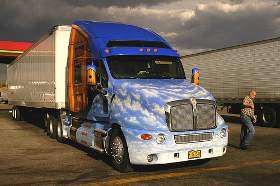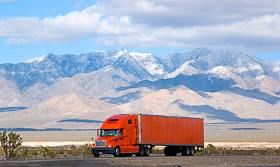PC Under Load.
Topic 32269 | Page 1
You can PC to the nearest safe, legal parking spot.
From FMCSA
Time spent traveling to a nearby, reasonable, safe location to obtain required rest after loading or unloading. The time driving under personal conveyance must allow the driver adequate time to obtain the required rest in accordance with minimum off-duty periods under 49 CFR 395.3(a)(1) (property-carrying vehicles) or 395.5(a) (passenger-carrying vehicles) before returning to on-duty driving, and the resting location must be the first such location reasonably available.
I'm not sure what the proper way is, but my company requires us to go back on duty to log our post trip after we PC to our location (usually hotel)
CSA:
Compliance, Safety, Accountability (CSA)
The CSA is a Federal Motor Carrier Safety Administration (FMCSA) initiative to improve large truck and bus safety and ultimately reduce crashes, injuries, and fatalities that are related to commercial motor vehicle
FMCSA:
Federal Motor Carrier Safety Administration
The FMCSA was established within the Department of Transportation on January 1, 2000. Their primary mission is to prevent commercial motor vehicle-related fatalities and injuries.
What Does The FMCSA Do?
- Commercial Drivers' Licenses
- Data and Analysis
- Regulatory Compliance and Enforcement
- Research and Technology
- Safety Assistance
- Support and Information Sharing
Fm:
Dispatcher, Fleet Manager, Driver Manager
The primary person a driver communicates with at his/her company. A dispatcher can play many roles, depending on the company's structure. Dispatchers may assign freight, file requests for home time, relay messages between the driver and management, inform customer service of any delays, change appointment times, and report information to the load planners.TCB;
This has always been a HUGE gray area; but safe haven IS definitely for hazmat.
Here's a good thread, with some explanatory links: FMCSA / Personal Conveyance.
My guy's having a similar day today; but being local, he'll do the 16 hr. exempt. That's confusing too, but at least 'we' get that one.
Rob T.'s spot on, tho!
Best to ya; sorry~
~ Anne ~
HAZMAT:
Hazardous Materials
Explosive, flammable, poisonous or otherwise potentially dangerous cargo. Large amounts of especially hazardous cargo are required to be placarded under HAZMAT regulations
CSA:
Compliance, Safety, Accountability (CSA)
The CSA is a Federal Motor Carrier Safety Administration (FMCSA) initiative to improve large truck and bus safety and ultimately reduce crashes, injuries, and fatalities that are related to commercial motor vehicle
FMCSA:
Federal Motor Carrier Safety Administration
The FMCSA was established within the Department of Transportation on January 1, 2000. Their primary mission is to prevent commercial motor vehicle-related fatalities and injuries.
What Does The FMCSA Do?
- Commercial Drivers' Licenses
- Data and Analysis
- Regulatory Compliance and Enforcement
- Research and Technology
- Safety Assistance
- Support and Information Sharing
Fm:
Dispatcher, Fleet Manager, Driver Manager
The primary person a driver communicates with at his/her company. A dispatcher can play many roles, depending on the company's structure. Dispatchers may assign freight, file requests for home time, relay messages between the driver and management, inform customer service of any delays, change appointment times, and report information to the load planners.If you go to pick up a load, knowing that you will be out of hours following that, and needing to park, that is going to raise a red flag if your logs are looked at by an inspector.
OWI:
Operating While Intoxicated

Yes you can use pc if you run out of time in the dock. That's one of the reasons, if not the main reason they made that reg.
Exactly right! I have had to PC out of a location twice. Each had more than three hours on the clock when I arrived at the location. Once was Moberly MO Walmart, I PC'd from the dock door, out the driveway and into the SAPP bros next door.
The second, bad trailer, and it took 4 hours from arrival, to transload complete. That one, it took me 5 miles to find a "safe" and legal spot.
Any other reason? Nope. If I'm under load, I'll take the hit on my logs to run it 5 mins over. I'd rather risk that, than get in trouble for improper use of PC.
If you go to pick up a load, knowing that you will be out of hours following that, and needing to park, that is going to raise a red flag if your logs are looked at by an inspector.
SAP:
Substance Abuse Professional
The Substance Abuse Professional (SAP) is a person who evaluates employees who have violated a DOT drug and alcohol program regulation and makes recommendations concerning education, treatment, follow-up testing, and aftercare.
TWIC:
Transportation Worker Identification Credential
Truck drivers who regularly pick up from or deliver to the shipping ports will often be required to carry a TWIC card.
Your TWIC is a tamper-resistant biometric card which acts as both your identification in secure areas, as well as an indicator of you having passed the necessary security clearance. TWIC cards are valid for five years. The issuance of TWIC cards is overseen by the Transportation Security Administration and the Department of Homeland Security.
OWI:
Operating While Intoxicated
Tonight I pulled into a rest area off Interstate 70 in Illinois. This was during regulation time and I planned to do my 10 there. Big sign on the way in says: NO OVERNIGHT PARKING. So I mosey down the road, run out of time, put myself on PC until I get to the next rest area. I don’t care if that was legal or not. Didn’t have any choice.
Interstate:
Commercial trade, business, movement of goods or money, or transportation from one state to another, regulated by the Federal Department Of Transportation (DOT).
Tonight I pulled into a rest area off Interstate 70 in Illinois. This was during regulation time and I planned to do my 10 there. Big sign on the way in says: NO OVERNIGHT PARKING. So I mosey down the road, run out of time, put myself on PC until I get to the next rest area. I don’t care if that was legal or not. Didn’t have any choice.
I've never gotten a knock on the door in any state to move because I was parked somewhere too long.
Interstate:
Commercial trade, business, movement of goods or money, or transportation from one state to another, regulated by the Federal Department Of Transportation (DOT).
Official FMCSA guidance
The movement from a shipper or receiver to the nearest safe resting area may be identified as personal conveyance, regardless of whether the driver exhausted his or her HOS , as long as the CMV is being moved solely to enable the driver to obtain the required rest at a safe location. The Agency recognizes that the driver may not be aware of the direction of the next dispatch and that in some instances the nearest safe resting location may be in the direction of that dispatch. If the driver proceeds to the nearest reasonable and safe location and takes the required rest, this would qualify as personal conveyance. FMCSA recommends that the driver annotate on the log if he/she cannot park at the nearest location and must proceed to another location.
https://www.federalregister.gov/documents/2018/06/07/2018-12256/hours-of-service-of-drivers-of-commercial-motor-vehicles-regulatory-guidance-concerning-the-use-of-a
Shipper:
The customer who is shipping the freight. This is where the driver will pick up a load and then deliver it to the receiver or consignee.
CSA:
Compliance, Safety, Accountability (CSA)
The CSA is a Federal Motor Carrier Safety Administration (FMCSA) initiative to improve large truck and bus safety and ultimately reduce crashes, injuries, and fatalities that are related to commercial motor vehicle
FMCSA:
Federal Motor Carrier Safety Administration
The FMCSA was established within the Department of Transportation on January 1, 2000. Their primary mission is to prevent commercial motor vehicle-related fatalities and injuries.
What Does The FMCSA Do?
- Commercial Drivers' Licenses
- Data and Analysis
- Regulatory Compliance and Enforcement
- Research and Technology
- Safety Assistance
- Support and Information Sharing
CMV:
Commercial Motor Vehicle
A CMV is a vehicle that is used as part of a business, is involved in interstate commerce, and may fit any of these descriptions:
- Weighs 10,001 pounds or more
- Has a gross vehicle weight rating or gross combination weight rating of 10,001 pounds or more
- Is designed or used to transport 16 or more passengers (including the driver) not for compensation
- Is designed or used to transport 9 or more passengers (including the driver) for compensation
- Is transporting hazardous materials in a quantity requiring placards
Fm:
Dispatcher, Fleet Manager, Driver Manager
The primary person a driver communicates with at his/her company. A dispatcher can play many roles, depending on the company's structure. Dispatchers may assign freight, file requests for home time, relay messages between the driver and management, inform customer service of any delays, change appointment times, and report information to the load planners.HOS:
Hours Of Service
HOS refers to the logbook hours of service regulations.
Tonight I pulled into a rest area off Interstate 70 in Illinois. This was during regulation time and I planned to do my 10 there. Big sign on the way in says: NO OVERNIGHT PARKING. So I mosey down the road, run out of time, put myself on PC until I get to the next rest area. I don’t care if that was legal or not. Didn’t have any choice.
I've never gotten a knock on the door in any state to move because I was parked somewhere too long.
Isn't that along the lines of people talking about never getting a ticket for speeding when being no more than 10 over? All it takes is one officer having a bad day? I just wonder if that isn't leading a rookie driver to end up getting jammed up for something unnecessarily.
Interstate:
Commercial trade, business, movement of goods or money, or transportation from one state to another, regulated by the Federal Department Of Transportation (DOT).
New Reply:
New! Check out our help videos for a better understanding of our forum features

















Preview:
This topic has the following tags:
Advice For New Truck Drivers Hours Of Service Personal Conveyance Safe Haven Time Management







 TT On Facebook
TT On Facebook
My DL is trying to give me a load that would require PC to park after pu. I told him that safe haven only appplies to hazmat. Who is right?
HAZMAT:
Hazardous Materials
Explosive, flammable, poisonous or otherwise potentially dangerous cargo. Large amounts of especially hazardous cargo are required to be placarded under HAZMAT regulations